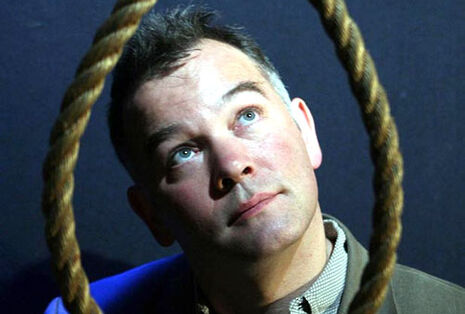Comedy, controversy and more comedy
Meet Stewart Lee, the notoriously uncompromising comedian behind Jerry Springer – The Opera

When I ask him about his status as an oft-cited inspiration for comedians, Stewart Lee is mystified. "I don’t understand it. My niece showed me in Russell Brand’s book where he cites me as an influence." The cynicism towards critical plaudits is genuine. On his publicity, alongside quotes attesting to the genius of his stand-up (Gervais describes him as "the funniest, most cliché-free comedian on the circuit") he also lists his worst reviews (among them: "The worst stand-up I have ever seen… smug and contemptible" – Chortle). Lee catalogues these reviews not as an act of defeatism, however, but out of a desire for something better.
Idealism permeates his most current tour show, If You Prefer a Milder Comedian, Please Ask for One. Most significant among the targets of his satire is Top Gear. In an unflinching routine, Lee wishes that Richard Hammond’s crash had been fatal before describing the imagined death in some detail, in order to ridicule the outrageous statements made by Top Gear hosts (Jeremy Clarkson having described Gordon Brown as a "one-eyed Scottish idiot"). On the night that I see it, the Suffolk audience largely doesn’t seem to appreciate the irony. Lee is unapologetic. "Most people get behind it eventually. It’s obvious what it means if you listen." Why is Top Gear so popular? "I think fearful middle Englanders feel comforted by Top Gear’s dismissal of supposedly politically correct concerns. Clarkson works this market very well."
Unlike many comedians, Lee is a proud supporter of political correctness. He doesn’t completely dismiss the shock comedy of Frankie Boyle and Jimmy Carr – "I’m a bit bored of it now. They are both technically very good writers though" – so much as react against their one-liner style: "People say I should Twitter, and write jokes of less than 140 characters, so my new aim is to write no joke less than 140 minutes." This is a fair reflection of Lee’s unique delivery – when the Richard Hammond routine became the target of opprobrium for the Mail on Sunday, the article noted with some distaste that "Lee spends 20 minutes telling audiences about his dislike of Hammond in his show."
Controversy is nothing new to him. Lee is most famous as the co-writer of provocative Jerry Springer – The Opera. However, when I ask what distinguishes this work from the Jonathan Ross debacle, he is succinct: "Jerry Springer – The Opera was a worthwhile piece of art with a point and a meaning. Brand/Ross was two over-excited men making a mistake." Lee is emphatic that comedy is underappreciated as an art form: "In most publicly funded arts centres up and down the country, [between] tribute acts and hypnotists, comedians are the only people taking actual original art to the masses." He is overwhelmingly committed to live stand-up as a form, rather than on television. "TV will get worse. Stand-up will get better." Can a comedian move into the mainstream and retain critical bite? "Not really. You can’t be a gamekeeper and a pheasant."
He remains uncompromising in both style and substance. While this hasn’t been without its penalties – he has noted in the past that he lost most of the proceeds from Jerry Springer as a result of staging it unaltered – he could never be accused of selling out. His last tour chronicled his difficulties with the BBC as they first commissioned, then dropped his television series (though Stewart Lee’s Comedy Vehicle was eventually broadcast last year, and has just been recommissioned). I ask if he feels vindicated in his unwillingness to compromise his vision and he replies: "Yes. It would have worked even better if we’d done it even more like what I wanted. But they were all very brave and tolerant." You get the impression that Lee is happy where he is.
 Interviews / You don’t need to peak at Cambridge, says Robin Harding31 December 2025
Interviews / You don’t need to peak at Cambridge, says Robin Harding31 December 2025 News / Unions protest handling of redundancies at Epidemiology Unit30 December 2025
News / Unions protest handling of redundancies at Epidemiology Unit30 December 2025 Comment / What happened to men at Cambridge?31 December 2025
Comment / What happened to men at Cambridge?31 December 2025 Features / ‘Treated like we’re incompetent’: ents officers on college micromanagement30 December 2025
Features / ‘Treated like we’re incompetent’: ents officers on college micromanagement30 December 2025 Theatre / We should be filming ADC productions31 December 2025
Theatre / We should be filming ADC productions31 December 2025








